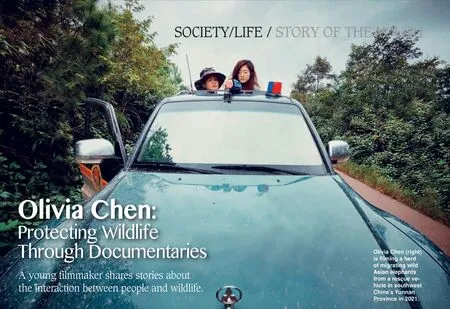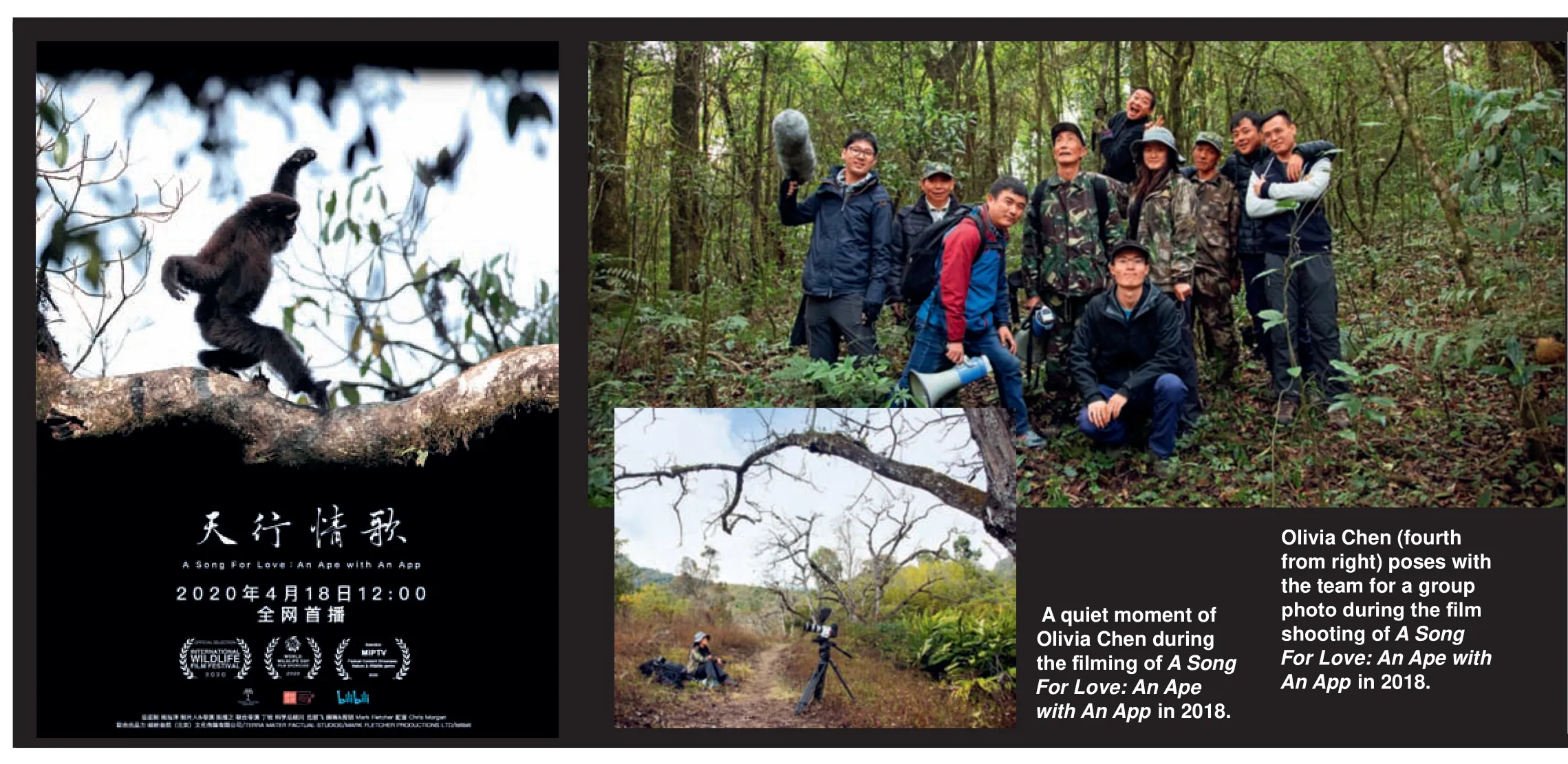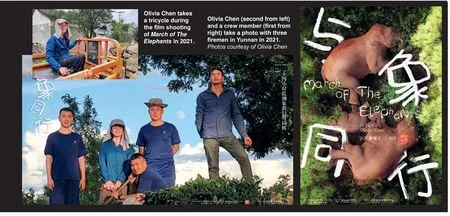Olivia Chen:Protecting Wildlife Through Documentaries
2022-10-16LUJIAJUN

Olivia Chen (right)is filming a herd of migrating wild Asian elephants from a rescue vehicle in southwest China’s Yunnan Province in 2021.
By staff reporter LU JIAJUN
NATURE and wildlife documentaries have always been an important art form. With the development of scientific investigations and ecological aesthetics, the focus of this kind of filmmaking has gradually expanded from offering educational content to looking into the role of humans as custodians of the world in which they live, of which wildlife is also an integral part.
The production and broadcast platforms of nature-themed documentaries in China have been gradually expanding from TV stations to streaming media platforms. Production teams continue to explore innovative ways to present stories about nature. Olivia Chen is a director and producer of one such team. Despite her slim figure, she is used to lugging cameras on her many wildlife shoots deep in the mountains and forests across the world, all the while diving deep into the interaction between humans and nature.
Curious about Apes
In 2011, Chen graduated from the Communication University of China, where she majored in radio and television editing and directing. Later, her work in the documentary channel of the Beijing Radio & Television Station brought her into the world of outdoor adventure, where she met up with some wildlife photographers. Working part-time, these photographers were keen on recording wild animals to provide references for scientific research, and attract more people’s attention to the status of wild animals and nature reserves in China. Chen was deeply moved and influenced by their attitude and dedication.
In 2016, Chen and a group of friends established Colorful Nature Films, a company dedicated to making documentaries on wildlife. “We all grew up watching the famous TV showAnimal World. When talking about wild animals, most people may only think of lions and wildebeests in Africa. Few people know about wildlife in China. But China has quite a unique biodiversity,” Chen toldChina Today.
Chen chose skywalker hoolock gibbons as the first wild animal to film. She was attracted by a decade-old study by Fan Pengfei, a professor of the School of Life Sciences of Sun Yat-Sen University. This species of ape, with a population of only around 150 in 2016, has a 99-percent similarity to humans in terms of genes, family structure, and social relationships. It was the first ape species existing in China she had heard of. And the species lives in monogamy. This added to Chen’s curiosity about the origins of apes and their connection to human civilization.

Based on Fan’s research, the documentary was originally planned to feature a gibbon of about nine years old, the eldest daughter of a four-member ape family. With her age equivalent to 18 of human beings, the adult gibbon would immediately leave her parents to establish her own territory and find a mate. However, she died prematurely before the filming.
Inbreeding is common among the ape species, resulting in defects of organ functions among many newborns. The death of the young ape depressed Fan and Chen’s team for a long time, but also reinforced their original intention: to increase more people’s awareness of the current situation of the ape species, and thus promote conservation for and research into them.
Later, Fan and the team conducted a scientific experiment on the apes. They used tools of livestreaming to guide the widely dispersed gibbons to venture on a blind date. This inspired the documentaryA Song For Love: An Ape With An App. The documentary starts with the discovery of gibbons in China and focuses on their current lives in the Gaoligong Mountains of southern China. The team managed to find a “Mr. Right” for a female gibbon in the mountains by livestreaming her singing. Two male apes, one from the Beijing Zoo and one on the other side of the mountains, were shortlisted.
“This was a true story and a time-consuming search. Continuous attention was needed. The good thing is that there are places where gibbons have begun to make spontaneous migrations in search of mates. Newborns are also emerging,”Chen toldChina Today.
After three and a half years, the documentary was finished and received a high rating of 9.8 on bilibili, China’s video platform. It won the Best Story Award at the 2020 NaturVision Film Festival, and made the list of the 2020 selection at the International Wildlife Film Festival. It has also been a winning and nominated documentary at more than 20 international film festivals.
Tracing Elephants
In March 2020, 16 wild Asian elephants left their habitat in the tropical forests of Xishuangbanna and roamed northward in southwest China’s Yunnan Province. The news drew widespread public attention. Chen was interested in the wandering herd and planned to film a feature documentary.However, as more and more video makers thronged in, animal protection authorities declined further media coverage on the event in order to guarantee the safety of the herd.
An opportunity came in August 2020, when Chen met two production teams from China International Publishing Group and Tencent, respectively. A filming team formed by the three parties got an approval to follow the herd and record its migration.

Chen recalled that her first encounter with the elephants was on a foggy mountain. Although monitoring drones lost sight of the herd, it was clear that they were around extrapolating from the traces they left. Fearing that the elephants would burst into nearby villages, the fire department went into the woods to track them down. Suddenly, two calf elephants, their mother, and the nanny elephant appeared less than 50 meters in front of a searching vehicle. The two adult elephants, escorting the young elephants, made a sharp bend and ran away.
Chen said she will never forget the scene. Despite their large size, she felt that they intentionally avoided conflict with humans to protect their babies. “Perhaps because I am a female, I could feel the forbearance of a mother’s love, which is a very subtle feeling,” said Chen.
The herd went on to wander in the mountains and forests.They ate crops and created trouble for villagers living around.To better protect the elephants, local authorities decided to escort them back to their habitats. They first managed to assure that humans will not hurt the elephants.
Finally, the herd returned to their habitat in Xishuangbanna on August 8, 2021 after traveling more than 500 kilometers.In the documentary, an infrared camera captured the entire process in which the elephants crossed the Yuanjiang River Bridge. Chen said that the infrared cameras set up before were destroyed by the elephants as they mistook them as toys. She believed that it was the trust established with the herd that allowed the filming team to record the precious moments.
After a year of production, the documentaryMarch of The Elephantswas released on August 12, 2022. The year-long interaction with the elephants helped Chen learn more about Asian elephants and reflect on the relationship between humans and wildlife.
“Although people are very small in the face of three-metertall elephants, people can guide them in forming a well-organized group. The relationship between us human beings and the wildlife depends more on our initiative. We are actually remedying the damage we have done [to wildlife] in the past,and gathering more sustainable resources to conserve biodiversity for our future generations,” Chen toldChina Today.
Interaction with many animals enabled Chen to gain inspiration from this subtle relationship of mutual respect with animals. She said that filming wildlife brings her a sense of simplicity, along with a feeling that all problems have solutions. Chen and her team will continue to protect the diversity of wildlife in China in the form of documentaries, telling more stories about Chinese people and their interaction with wild animals. “As Dr. Jane Goodall once said, ‘Only if we understand can we care. Only if we care will we help. Only if we help shall all be saved,’” quoted Chen.C
